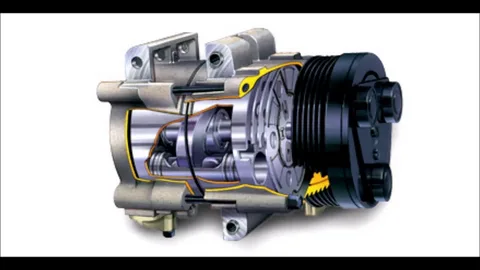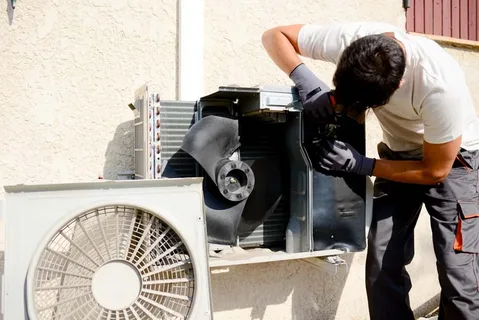Air-Conditioning Compressors are the powerhouse behind your cool, comfortable home. Have you ever wondered how they work? This blog post explores some of the most exciting facts about these incredible machines and how they help keep you cool! From how they work to their environmental impact, read on to learn more about Air Conditioning Compressor and why they’re so important.
The Invention of Air-Conditioning Compressors
The invention of air-conditioning compressors revolutionized the way we live and stay comfortable in our homes. The story begins in the early 1900s when Willis Carrier, an engineer, developed the first air conditioner. He recognized the need for a solution to control temperature and humidity in industrial environments. Little did he know that his invention would transform factories and our homes.
The carrier’s air conditioner utilized a compressor to circulate refrigerant and remove heat from the air. This process was a breakthrough in cooling technology. It allowed for the precise control of temperature, providing a relaxed and comfortable environment even during the hottest days.
Before air-conditioning compressors, people relied on fans, open windows, and even ice to keep cool. The invention of the air conditioner was a game-changer, making it possible to cool indoor spaces and improve quality of life.
Over the years, air-conditioning compressors have become smaller, more efficient, and more environmentally friendly. They have also found their way into countless homes around the world. Today, we can’t imagine our lives without the cooling power of air-conditioning compressors.
How Do Air-Conditioning Compressors Work?
Air-conditioning compressors may seem like magical machines, but their workings are quite fascinating. These powerful devices use a combination of physics, chemistry, and engineering to cool the air in our homes.
At its core, an air-conditioning compressor compresses and circulates refrigerant throughout the system. The refrigerant absorbs heat from the air inside your home, turns it into a gas, and is then compressed by the compressor. This compression increases the refrigerant’s temperature and pressure, causing it to release heat to the outside environment.
The hot, compressed refrigerant then flows through a condenser coil, which cools down and condenses into a liquid state. As the refrigerant condenses, it releases heat to the surrounding air. This process is similar to when water vapor condenses into liquid water, releasing heat.
Once the refrigerant has been cooled and condensed, it moves to the evaporator coil, which expands and evaporates back into a gas. As it evaporates, the refrigerant absorbs heat from the air inside your home, causing the air to cool down. The cool air is then circulated back into your home while the refrigerant continues its journey to repeat the cooling cycle.
Types of Air Compressors
Several types of air compressors are commonly used in air conditioning systems. Understanding these types can give you a better idea of how your compressor works and what makes it unique.
One common type of air compressor is the reciprocating compressor. This type uses a piston that moves back and forth to compress the refrigerant. It’s similar to the pistons in a car engine. Reciprocating compressors are known for their durability and efficiency, making them popular for many air conditioning systems.
Another type is the rotary compressor. This type uses rotating blades or screws to compress the refrigerant. Rotary compressors are often used in larger air conditioning systems because they can handle more air.
Scroll compressors are another type commonly used in air conditioning. They use two interlocking spiral disks to compress the refrigerant. Scroll compressors are known for their quiet operation and efficiency, making them a great choice for residential air conditioning systems.
Each type of air compressor has its advantages and is suited to different air conditioning systems. Understanding these differences can help you choose the right compressor for your cooling needs.
The Role of Compressor Efficiency in Cooling Systems
The efficiency of the Air-Conditioning Compressor plays a crucial role in the overall cooling system. You want your compressor to be as efficient as possible when it comes to keeping your home cool and comfortable.
Compressor efficiency refers to how effectively the compressor converts electrical energy into cooling power. A more efficient compressor will consume less energy while providing the same level of cooling. This reduces your energy bills and minimizes the environmental impact of your air conditioning system.
One way to measure compressor efficiency is through the Seasonal Energy Efficiency Ratio (SEER). The higher the SEER rating, the more efficient the compressor. Choosing a higher SEER rating compressor can result in significant energy savings over time.
Various factors, including the design, size, and technology of the compressor influence compressor efficiency. Advancements in compressor technology have led to more efficient compressors that can deliver better cooling performance while using less energy.
Regular maintenance is also crucial for ensuring the efficiency of your compressor. Cleaning or replacing air filters, checking refrigerant levels, and scheduling professional tune-ups can all help optimize the efficiency of your air conditioning system.
Maintenance Tips to Keep Your Air-Conditioning Compressor in Top Shape
Your air-conditioning compressor works hard to keep you cool, so giving it the care and attention it deserves is important. Here are some maintenance tips to help keep your compressor in top shape:
- Regularly clean or replace air filters: Dirty air filters can restrict airflow and make your compressor work harder than necessary. Clean or replace them every few months to keep your system running smoothly.
- Check refrigerant levels: Low refrigerant levels can strain your compressor and reduce efficiency. Schedule regular maintenance to ensure proper refrigerant levels and avoid any potential issues.
- Clean the condenser coils: Over time, dirt and debris can accumulate on them, affecting their ability to release heat. Use a soft brush or a vacuum cleaner to clean the coils and keep them free from debris gently.
- Keep the surrounding area clear: Ensure the area around your compressor is free from obstructions, such as tall grass, leaves, or debris. Proper airflow is crucial for the efficient operation of your compressor.
- Schedule professional tune-ups: Regular maintenance by a professional technician can identify any potential problems and ensure that your compressor is running at its best. They can also make necessary adjustments and lubrication to keep everything in shape.
Troubleshooting Common Air-Conditioning Compressor Issues
As much as we rely on Air-Conditioning Compressors to keep us cool, sometimes they can encounter issues. Here are some common problems you may encounter with your air-conditioning compressor and some troubleshooting tips to help you out:
- Insufficient cooling: Check the air filters if your air conditioner isn’t cooling your home as it should. Clogged filters can restrict airflow and reduce cooling performance. Clean or replace them if necessary.
- Strange noises: Unusual sounds from your compressor, such as grinding or rattling, can indicate a problem. It could be a loose component or a worn-out part. It’s best to have a professional technician inspect and repair it.
- Refrigerant leaks: If you notice a refrigerant leak, it’s essential to address it promptly. Low refrigerant levels can cause your compressor to work harder and may lead to compressor damage. Call a professional to locate and fix the leak.
- Tripping circuit breaker: If your compressor keeps tripping the circuit breaker, it could be due to an electrical issue. Check for loose connections or damaged wiring. If you can’t identify the problem, call a professional for assistance.
- Compressor not turning on: If your compressor fails to turn on, check the thermostat settings and ensure the power supply is connected properly. If everything seems fine, it could be a problem with the compressor itself. Consult a professional for further diagnosis and repair.
Advancements in Holden Air Conditioning Compressors Technology
Advancements in technology have played a significant role in the evolution of air conditioning compressors, and Holden is at the forefront of these exciting developments. With a focus on innovation and efficiency, Holden has made impressive strides in improving their Air-Conditioning Compressors’ performance and environmental impact.
One key advancement is the use of variable speed compressors. Unlike traditional compressors that run at a fixed speed, variable speed compressors can adjust their speed based on the cooling needs of your home. It not only results in more precise temperature control but also leads to significant energy savings. By running at lower speeds when less cooling is required, variable speed compressors can reduce energy consumption by up to 40% compared to traditional compressors.
Holden has also incorporated advanced refrigerants and materials into their compressors to improve their environmental impact. These new refrigerants have a lower Global Warming Potential (GWP) and ozone depletion potential, making them more environmentally friendly. Additionally, the use of high-quality materials in the construction of Holden Air Conditioning Compressors ensures durability and longevity, reducing the need for frequent replacements.
FAQ’s
1. How often should I replace my Air-Conditioning Compressor?
Typically, Air-Conditioning Compressors have a lifespan of around 10-15 years. However, this can vary depending on usage, maintenance, and the compressor’s quality. It’s best to consult with a professional to determine if your compressor needs to be replaced.
2. Can I clean my Air-Conditioning Compressor myself?
While there are some maintenance tasks you can do yourself, such as cleaning or replacing air filters, it’s recommended to leave more complex cleaning or repairs to a professional technician. They have the knowledge and tools to safely and effectively maintain your compressor.
3. How can I improve the efficiency of my Air-Conditioning Compressor?
There are several ways to improve compressor efficiency. Regular maintenance, such as cleaning the coils and checking refrigerant levels, is essential. Additionally, ensuring proper insulation and sealing of your home can prevent cool air from escaping, reducing the workload on your compressor.
4. Can I use my Air Conditioning Compressor during the winter?
It’s generally not recommended to run your Air-Conditioning Compressor during the winter months, as it’s designed for cooling rather than heating. Instead, use a separate heating system or a heat pump, if available.
Conclusion
Air-Conditioning Compressors are the unsung heroes behind our cool and comfortable homes. From the invention of the air conditioner by Willis Carrier to the latest advancements in technology, these incredible machines have revolutionized the way we live. Understanding how they work, the different types available, and the importance of compressor efficiency can help us appreciate their role in keeping us cool. By following maintenance tips and troubleshooting common issues, we can ensure that our Air-Conditioning Compressors stay in top shape. And with advancements in technology, companies like Holden are leading the way in making compressors more efficient and environmentally friendly. So the next time you chill out in your cool home, take a moment to appreciate the power of the Air-Conditioning Compressor.



